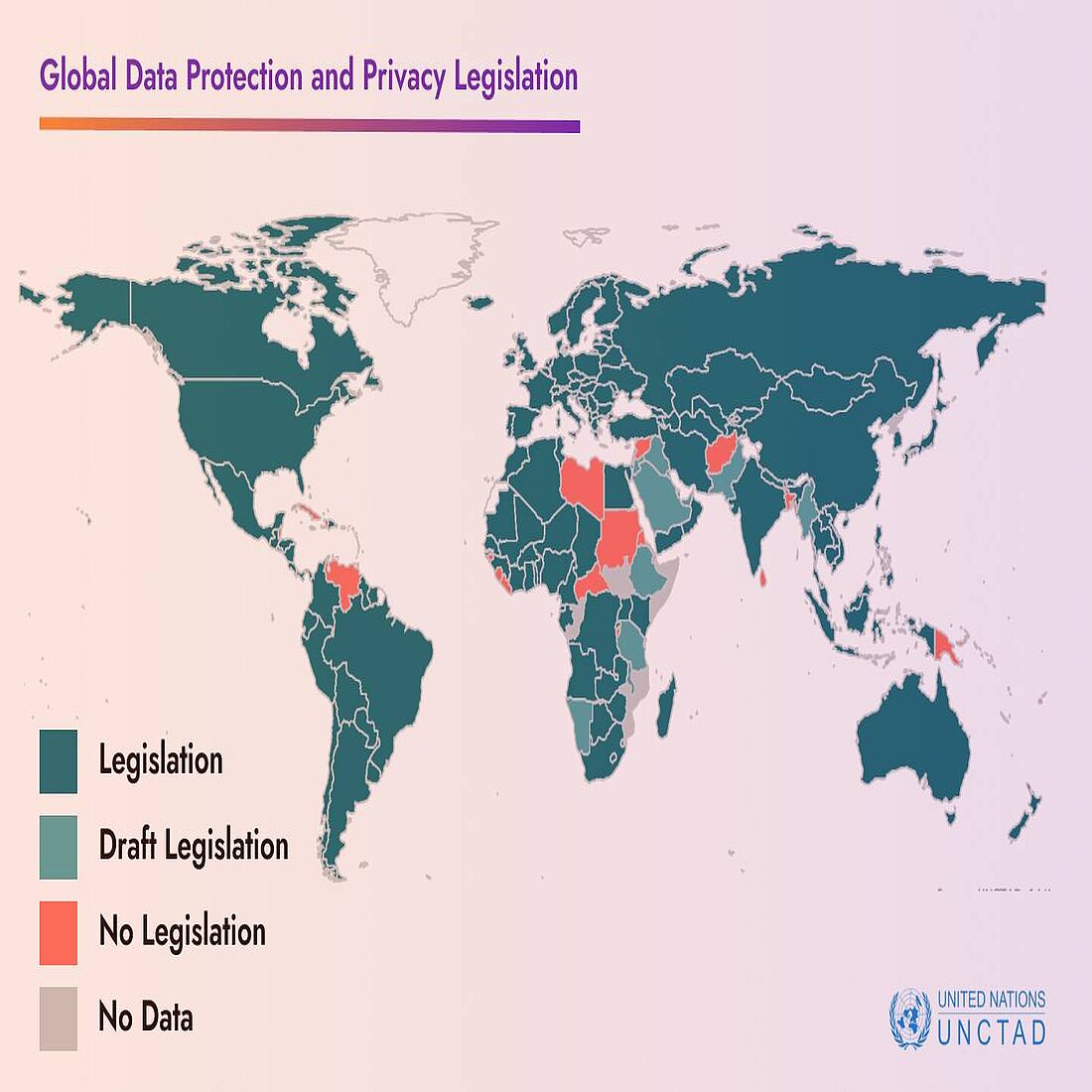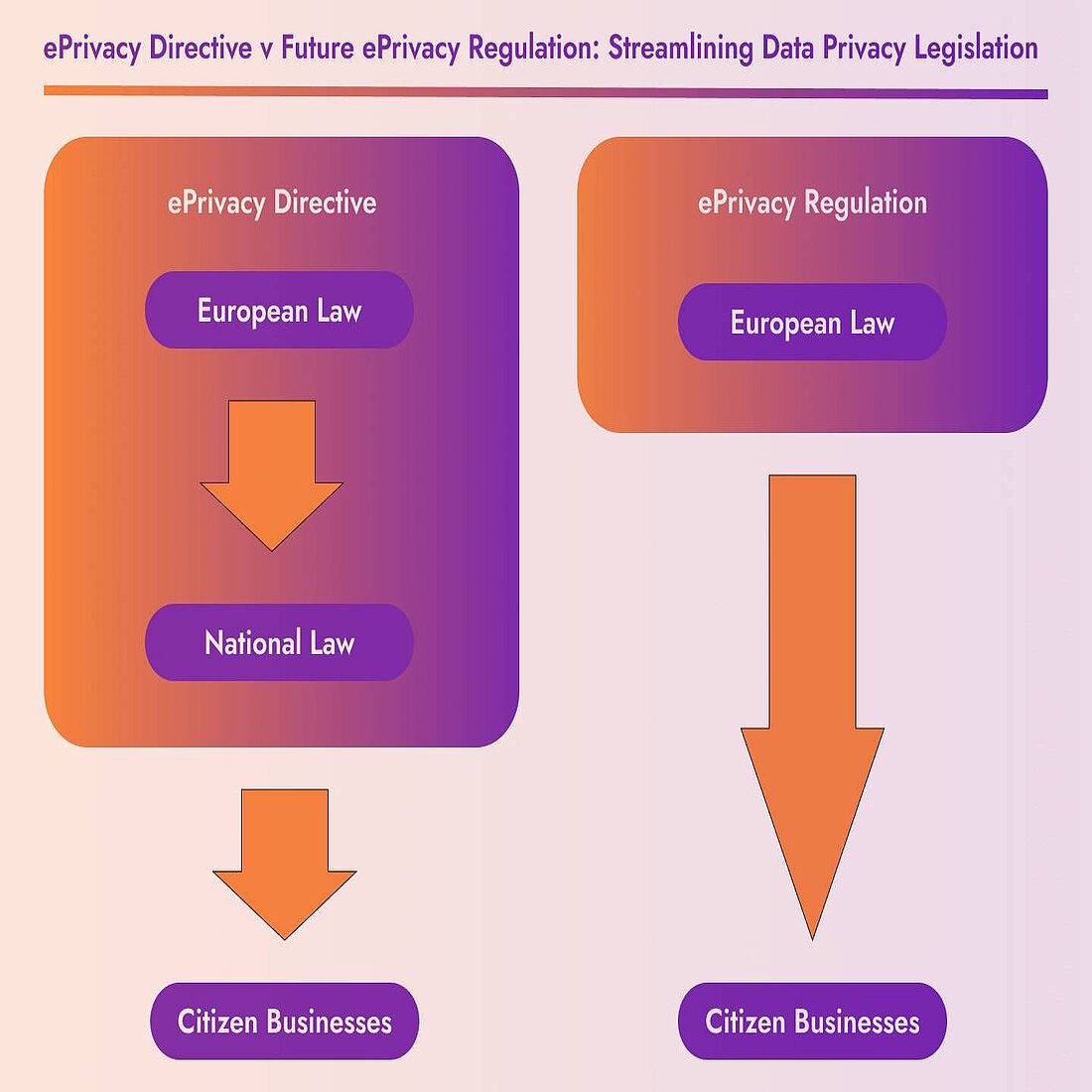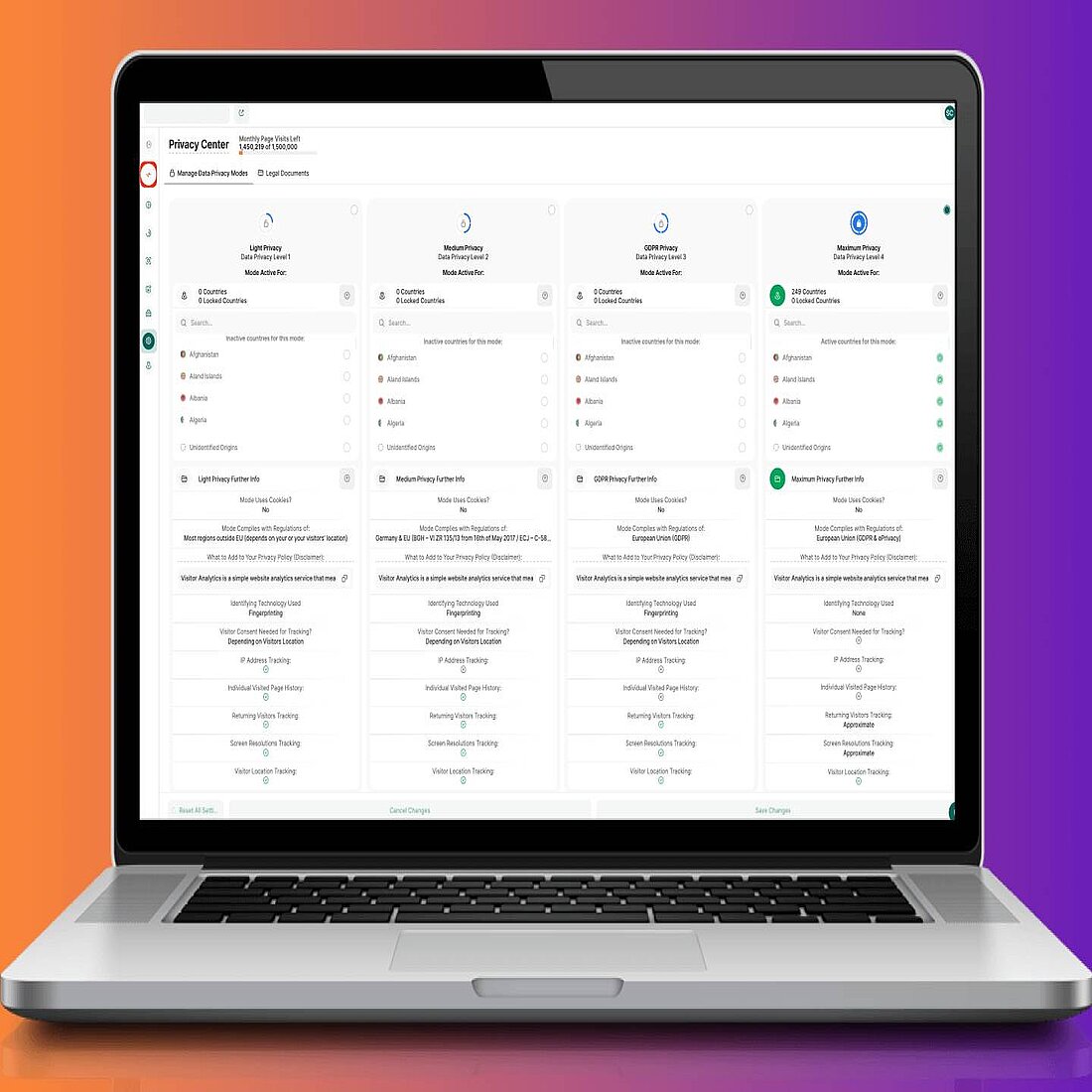
Simon Coulthard July 21, 2023
- What is the GDPR Data Privacy Legislation?
- Analytics Cookie Compliance Under GDPR
- What is the ePrivacy Directive Data Privacy Legislation?
- Analytics Cookie Compliance Under the ePrivacy Directive
- How to Ensure Analytics Fully Meets EU Data Privacy Legislation
- Facilitate Compliance with Privacy-First Website Intelligence
- FAQs

Data privacy legislation and cookie compliance are critical considerations for online business.
They have real implications for third-party website integrations.
Website analytics in particular is vital if companies are to collect the data-driven insights about internet user behavior that they can leverage to increase sales and repeat business.
However, this needs to be done in a way that respects the GDPR and ePrivacy Directive.
These are two elements that make up the EU’s data privacy regulatory framework.
This article will therefore provide an overview of the two, even if there are obviously other global data privacy regulations to consider.
It will then cover the cookie compliance requirements that will keep website analytics on the right side of the law.
Keep reading, and you'll also learn about website analytics platforms that use cookieless tracking.
This privacy-first technology is important because it enables businesses to meet legal obligations around customer data without implementing cookie compliance measures.
Let’s dive in!
Unlock Your Website's True Potential
Our advanced website intelligence solution will enable anyone to grow their website quickly - all while staying data privacy compliant!

What is the GDPR Data Privacy Legislation?
The General Data Protection Regulation exists to protect the data privacy of EU citizens online.
It regulates how businesses can collect, store, and also process personal data. And for that reason, this law has real consequences for cookie-enabled analytics integrations. It also has implications for marketers that use this software.
The GDPR introduced a set of principles to ensure that businesses handle personal data in a lawful and transparent manner.
It affects any business operating in the EU or selling to EU citizens, regardless of whether they have a physical presence in Europe.
So our friends across the pond need to take note because GDPR compliance applies to US companies.
Key Aspects of the GDPR:
| 1 | Expanded Scope | The GDPR broadened the reach of EU data protection laws, covering a wider range of personal data and extending its jurisdiction beyond EU/EEA borders. |
| 2 | Consent | Obtaining clear and informed consent from individuals before processing their personal data is crucial under the GDPR. Consent should be given freely, with specific purposes disclosed, and individuals should have the ability to withdraw consent easily. |
| 3 | Data Subject Rights | The GDPR grants individuals specific rights to their personal data. They can access their data, correct inaccuracies, request erasure in certain cases, and object to or restrict certain types of data processing. |
| 4 | Accountability and Transparency | Organizations are expected to implement appropriate measures to protect personal data, be transparent about their data processing practices, and maintain detailed records of their processing activities. |
| 5 | Data Breach Notifications | In the event of a data breach, organizations are required to notify the relevant supervisory authority and, in some cases, inform affected individuals about the breach. |
| 6 | Data Protection Impact Assessments (DPIAs) | Organizations should conduct DPIAs for high-risk processing activities to assess and mitigate potential user data privacy risks. |
| 7 | Penalties and Fines | Non-compliance can result in substantial GDPR penalties, with fines of up to €20 million or 4% of a company's global annual turnover, whichever is higher. |
Ultimately, the GDPR empowers individuals by giving them more control over their personal data.
This EU data privacy legislation encourages businesses to prioritize privacy in their data practices and has fostered greater awareness of data protection and user data privacy.
It has also been used as a model by policymakers for the development of other regional and national laws.

What is the ePrivacy Directive Data Privacy Legislation?
The ePrivacy Directive is an EU ruling that focuses on privacy and the protection of personal data in electronic communications.
It's called a "directive" because it's not a binding law in and of itself.
On the contrary, this piece of user data privacy legislation instructs EU member states to create their own national laws that align with it. The result of this is that there are variations in the transposition of the law from country to country. However, they are all broadly similar in nature.
It was first introduced in 2002 and was later updated in 2009.
The directive complements the GDPR by providing specific rules and requirements for electronic communications.
For that reason, the directive includes restrictions on the use of cookies and similar tracking technologies.
The main objective of the ePrivacy Directive is consequently to safeguard the privacy of individuals when using electronic communications services, and so impacts websites, emails, and instant messaging platforms accordingly.
It addresses the collection, storage, and access to information stored on users' devices, including cookies.
Article 5(3) ePrivacy Directive Implementation Across the EU
| Austria | Article 96(3) - Federal Act Enacting the Telecommunications Act 2003. |
| Belgium | Article 129 - Law of 13 June 2005 on Electronic Communications. |
| Croatia | Article 100(4) - Electronic Communications Act 2008. |
| Cyprus | Section 99(5) - Electronic Communications and Postal Services Regulations Act 2004. |
| Denmark | Articles 3 and 4 - Executive Order No. 1148 of 9 December 2011 on Information and Cookie Consent Required in Case of Storing or Accessing Information in End-User Terminal Equipment. |
| Finland | Section 205 - Information Society Code. |
| France | Article 82 - Act No. 78-17 of 6 January 1978 on Data Processing, Data Files and Individual Liberties. |
| Germany | The Federal Act on the Regulation of Data Protection and Privacy in Telecommunications and Telemedia of 23 June 2021. |
| Greece | Article 4(5) - Law 3471/2006 on the Protection of Personal Data and Privacy in the Electronic Telecommunications Sector and Amendment of Law 2472/1997. |
| Hungary | Article 155(4) - Act C of 2003 on Electronic Communications. |
| Ireland | Article 5(3), (4), and (5) of the S.I. No. 336/2011 – European Communities (Electronic Communications Networks and Services) (Privacy and Electronic Communications) Regulations 2011. |
| Italy | Article 122 - Personal Data Protection Code, Legislative Decree No. 196/2003. |
| Latvia | Section 7(1) - Law on Information Society Services 2004. |
| Lithuania | Article 61(4) - Law on Electronic Communications 2004. |
| Luxembourg | Article 4 - Act of 30 May 2005 Laying Down Specific Provisions for the Protection of Persons with regard to the Processing of Personal Data in the Electronic Communications Sector and amending Articles 88-2 and 88-4 of the Code of Criminal Procedure. |
| Malta | Article 5 - Processing of Personal Data (Electronic Communications Sector) Regulations of 2003. |
| Netherlands | Article 11.7a - Telecommunications Act 1998. |
| Poland | Article 173 - Telecommunications Act of 16 July 2004. |
| Portugal | Article 5(1) and (2) - Law No. 46/2012 of 29 August 2012. |
| Romania | Article 4(5) - Law No. 506/2004 on the Processing of Personal Data and the Protection of Privacy in the Electronic Communications Sector. |
| Slovakia | Section 55(5) of Act No. 351/2011 - Coll. on Electronic Communications. |
| Slovenia | Article 157 - Electronic Communications Act. |
| Spain | Article 22(2) - Law No. 34/2002, of 11 July 2002, on Information Society Services and Electronic Commerce. |
| Sweden | Section 18 of Chapter 6 - Electronic Communications Act. |
Discussions on a Replacement ePrivacy Regulation
It is important to note that the ePrivacy Directive is currently undergoing revision.
This directive is expected to be replaced by the ePrivacy Regulation, which will harmonize and strengthen privacy rules across the European Union.
The updated regulation aims to modernize the rules in light of technological advancements and align them with GDPR requirements.
How to Ensure Analytics Fully Meets EU Data Privacy Legislation
Businesses should work to adhere completely to the framework of data privacy legislation in the EU, and their choice of analytics integration is central to this.
This rules out Google Analytics, given the recent crackdown on users by Sweden's regulator, ruling by Norway's DPA, and its other well-known issues across the EU.
Simply put, it's another reason why users should switch from Google Analytics to TWIPLA.
Instead, it's best to choose an integration that takes a consentless approach to both personal and non-personal data.
This level of cookie compliance is available from the privacy-first website intelligence market.
TWIPLA is a prominent player in this emerging market. It boasts over 2 million installations worldwide, and has received many industry awards and positive reviews.
It aligns with the GDPR's "privacy by design" criteria and offers a privacy center that enables businesses to customize functionality to local user data privacy requirements.
Notably, TWIPLA utilizes advanced fingerprinting technology that refrains from storing any data on user devices or tracking IP addresses, which are often deemed personal data.
And when the default maximum privacy mode is enabled, businesses can collect highly accurate data without tracking the specificities of individual user behavior.
By adopting this approach, businesses therefore gain valuable insights to optimize their websites without compromising EU or national data privacy standards.
Consequently, there is no need to activate any cookie consent banners, eliminating distractions that can potentially reduce sales and hinder repeat business.
Unlock Your Website's True Potential
Our advanced website intelligence solution will enable anyone to grow their website quickly - all while staying data privacy compliant!

Facilitate Compliance with Privacy-First Website Intelligence
Building cookie compliance with user data privacy legislation into business practices is a great way to enhance website credibility and customer trust.
This aligns with customer expectations at a time when online security and the misuse of customer data are growing concerns.
In the online realm, credibility acts as the primary currency, driving sales and enabling businesses to achieve their objectives.
While website analytics plays a pivotal role in any successful online business, selecting a website intelligence platform such as TWIPLA can bolster credibility while minimizing compliance burdens accordingly.
It offers a wide range of features, including comprehensive website statistics, visitor behavior analytics, and visitor communication tools.
As a result, our solution empowers businesses to make well-informed decisions without compromising user privacy.
So sign up today and try the platform out for size.
FAQs
What is the GDPR, and how does it relate to the ePrivacy Directive?
The GDPR is a comprehensive data protection regulation that governs the processing of personal data in the EU. The ePrivacy Directive complements the GDPR by focusing specifically on privacy in electronic communications, including the use of cookies and similar technologies.
What is the significance of analytics in the context of the GDPR and ePrivacy Directive?
Website analytics plays a crucial role in understanding user behavior and optimizing online experiences. Nevertheless, it must comply with the GDPR and ePrivacy Directive, ensuring proper consent for data collection, transparency in tracking practices, and the protection of users' privacy rights.
How does cookie consent fit into the GDPR and ePrivacy Directive requirements?
Cookie consent is a vital aspect of compliance. This is because websites must obtain informed and explicit consent from users before placing cookies, except for essential cookies. Consequently, consent must be freely given, specific, and easily revocable, aligning with the principles of the GDPR and ePrivacy Directive. Alternatively, you could choose a website analytics platform like TWIPLA that uses cookieless tracking technology - removing the need for cookie consent altogether.
What are the consequences of non-compliance with the GDPR and ePrivacy Directive regarding analytics and cookie consent?
Non-compliance can result in penalties that include substantial fines and reputational damage. Violations of the GDPR can lead to penalties of up to €20 million or 4% of global annual turnover, and non-compliance with the ePrivacy Directive can result in enforcement actions by regulatory authorities in the same way. Customer trust and credibility can also be affected as a result.
How can businesses ensure compliance while utilizing analytics and managing cookie consent?
Businesses can achieve compliance by implementing privacy-friendly analytics tools and obtaining user consent through compliant cookie consent banners or pop-ups. They should prioritize transparency, offer clear opt-out mechanisms, and keep records of user consent to demonstrate compliance with the GDPR and ePrivacy Directive. Sign up to TWIPLA today and get the insights you need without having to worry about cookie compliance measures!
Share article
Get Started for Free
Gain World-Class Insights & Offer Innovative Privacy & Security


Stay Updated & Get Inbox Insights
Keep pace with the world of privacy-first analytics with a monthly round-up of news, advices and updates!











